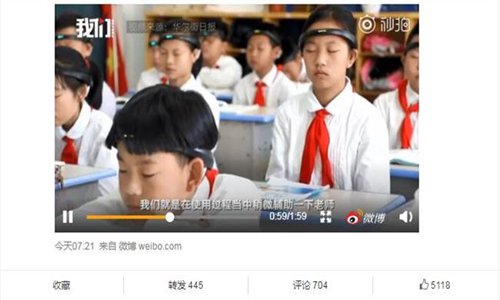HOME >> CHINA
Firm denies using AI headband to monitor students
By Xu Keyue Source:Global Times Published: 2019/10/31 21:43:41

Photo: Screenshot of a media report on the AI headband at a Zhejiang Province primary school.
A company developing neuroscience technology products has denied a foreign report that it used an AI-powered headband to monitor students and violated personal data privacy, saying it aims to help students improve concentration and learning efficiency.
Yang Zhangpeng, director of public relations at BrainCo, with its foreign branch in Boston, the US and Chinese branch in Hangzhou, East China's Zhejiang Province, told the Global Times on Thursday that a Wall Street Journal (WSJ) report on October 24 was biased and "not consistent with the facts."
The company only collects and analyzes the brain waves in regions associated with student attention by putting the headband on students' heads in class, and provides training courses to help them improve their concentration, Yang said, noting that the company and school never had nor would they monitor students' behavior or violate their privacy.
"We have special data protection measures. Brain data is one of the core secrets of the company. They are safely stored," Yang noted.
A teacher at Jinhua Xiaoshun Primary School in Jinhua, Zhejiang was quoted by the Beijing News on Wednesday as saying that the headband has been used for nearly a year with no obvious side effects.
The response came after the report said the school "closely monitored" students by introducing the headwear to detect electrical activity in the students' brains, sending the data to a teacher's computer. The software generates real-time alerts about students' attention spans and gives an analysis at the end of each class.
The headband uses three electrodes - one on the forehead and two behind the ears - to measure electrical signals from neurons in the brain and translate them into an attention score using an algorithm.
On BrainCo's shop on e-commerce giant JD.com, their products, priced at 3,499 yuan ($497), are sold every day.
After using the devices for half a semester, the class moved up two places in the test results among all of the school's fourth-grade classes, a teacher of the class was quoted by the report as saying.
Following the report, the company found itself under fire as many Chinese netizens expressed their concerns that the system would violate students' privacy and even have a negative psychological impact.
Yang said the parents signed an agreement to let their children wear the product after talking to the children. And students are studying harder than ever.
Students only need to wear the headband in one class or half an hour a day, Yang said.
Teachers at the school only can receive the average value of every student's attention, instead of specific brain wave data.
Yang noted that the WSJ reached him and cheated him by saying they would publish a report on the application and development of high technology in China's education sector.
However, the report even accused parents and teachers in China of valuing education more than personal privacy without investigating, insiders in the education field told the Global Times.
"From kindergartens to universities, digital cameras scan students, detecting whether they participate in class or talk behind the teacher's back, and facial-recognition robots take attendance and quiz toddlers. Bluetooth wristbands record heart rates and how much time a student spends in the library or at the playground," the report said.
"Schools are very cautious about using AI technology… as they always serve the students based on the principles of growing healthily," a teacher at a Shanghai-based primary school, which adopted facial recognition technology for campus security, told the Global Times.
China's Ministry of Education released in February a document, calling for tighter regulations and on digital education and network security in schools, according to China's Cyberspace Administration.
Posted in: SOCIETY